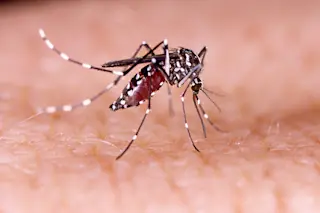(Credit: Tacio Philip Sansonovski/Shutterstock) Scientists from the Centers for Disease Control and Prevention (CDC) are scrambling to figure out how a Utah caregiver became ill with Zika. The virus is overwhelmingly transmitted via bites from infected mosquitoes, but can also spread through sexual contact. The case in Utah seems to be the result of something completely different, however, say state officials. Scientists aren't exactly sure how the person became infected, but they working to figure what's behind this latest twist in the ongoing epidemic.
According to the Wall Street Journal, the patient was caring for their elderly father, who became infected with the virus after traveling to an area with Zika. The elderly man eventually passed away, although it isn't known how Zika factored into his death as he had other health complications as well. That man was the first person with Zika to die in the continental U.S. and ...














